Latest bout of friction with political circles presses conglomerates to assume more social responsibility
When asked what word first comes to mind when large corporations are mentioned during a TV interview in July, Grand National Party Chairman Hong Joon-pyo gave an answer that left his interviewer and audience taken aback: “Exploitation.”
At the end of the interview, Hong came back to the question, worrying his word choice may have left him misunderstood. “What I really meant was that big companies should try harder to allow small businesses and working-class people to benefit from their growing profits,” he said.
When asked what word first comes to mind when large corporations are mentioned during a TV interview in July, Grand National Party Chairman Hong Joon-pyo gave an answer that left his interviewer and audience taken aback: “Exploitation.”
At the end of the interview, Hong came back to the question, worrying his word choice may have left him misunderstood. “What I really meant was that big companies should try harder to allow small businesses and working-class people to benefit from their growing profits,” he said.
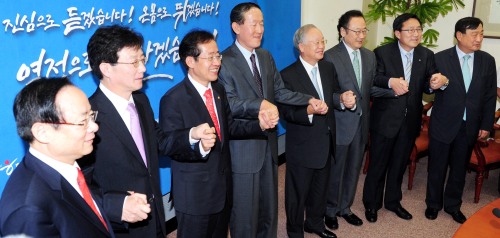
But many observers interpreted his remarks as revealing the sentiment in political circles, which have been bashing the chaebol, or family-run conglomerates, criticizing them for being preoccupied with vested interests and turning a blind eye to social responsibility.
In recent months, the ruling GNP and the main opposition Democratic Party have announced measures to curb the overexpansion of chaebol and give breathing room to small- and medium-sized enterprises as well as the self-employed. A dozen bills aimed at reining in excessive business practices by chaebol companies are awaiting parliamentary approval.
Members of the conservative governing party, which has been relatively more business-friendly, have been more aggressive than liberal opposition lawmakers in putting pressure on big companies.
“When I attended a recent parliamentary session, I felt as though nearly 70 or 80 percent of lawmakers belong to the opposition,” said Prime Minister Kim Hwang-sik in a meeting with GNP officials last month.
The Federation of Korean Industries, the nation’s leading business lobby group, came under fire earlier this month when a belatedly disclosed document showed it had attempted to match major conglomerates with influential politicians for lobbying to thwart anti-business legislation. FKI officials said the scheme had not been put into practice due to lukewarm responses from the conglomerates.
But the attempt, which critics said was an anachronistic bid to revive the past cozy ties between large enterprises and politicians, apparently reflected the heavy pressure business circles were feeling in the face of a raft of regulatory moves by political parties.
Heaping pressure
Lawmakers of both the ruling and opposition parties are pushing for ways to ban conglomerates from encroaching on business areas reserved for SMEs and pushing suppliers too hard to cut prices. GNP lawmakers also joined the opposition in calling for the government to withdraw the plan to cut corporate and income taxes.
Such moves come on top of a government policy shift to taking more care of the SME sector, self-employed people and working-class families, which has been accelerated since President Lee Myung-bak initiated the idea of shared growth last year. In Monday’s address marking Liberation Day, Lee reaffirmed his resolve to ensure shared and balanced growth. He proposed a new model of market economy, in which big businesses are required to stick to ethical management and take more social responsibility to break the vicious cycle of the rich getting richer and the poor becoming poorer.
Former Prime Minister Chung Un-chan, who heads a commission on shared growth, suggested early this year large companies share some of their profits with their suppliers.
The business circle has criticized politicians for bashing large enterprises as part of their populist maneuvering aimed at winning voters’ hearts in the lead-up to the parliamentary and presidential elections next year. It has expressed concerns the latest bout of chaebol bashing will undermine market economy principles and hamper the country’s international competitiveness amid the deepening global economic crisis.
What made the frictions between politicians and big businesses go above the surface was remarks FKI chairman Huh Chang-soo made in his first news conference in June since taking office in February. Huh, who also heads GS Group, expressed opposition to the move to roll back tax cuts, saying it is against the global trend and companies can invest more when it has the means to do so. He also denounced the ruling party’s proposal to halve college tuition fees as impromptu, pledging to raise voices against a flood of populist policies to be pitched in the run-up to the elections.
The FKI said in a report to the Finance Ministry last month that the maximum corporate tax rate should be down from 22 percent to 20 percent next year as planned to ensure policy consistency.
In a meeting with Strategy and Finance Minister Bahk Jae-wan in late June, Huh continued striking a critical tone, saying he doubted that pure and clear principles considering the future of the nation have been taken into account in making crucial decisions. Days later, Huh and leaders of three other business organizations refused to attend a parliamentary hearing on shared growth.
His remarks caused backlash from political circles, similar to the response Samsung Electronics chairman Lee Kun-hee faced after expressing negative views on the idea of big companies sharing some of their profits with suppliers.
Reform-minded lawmakers in the ruling party were especially harsh in responding to the FKI head’s remarks. “Everyone knows how well conglomerates are going now. Such remarks show how preoccupied they are with keeping their own interests,” said Rep. Nam Kyung-pil. GNP chief policymaker Rep. Lee Ju-young also criticized Huh for being narrow-minded.
In a meeting with Huh and other business leaders in July, GNP leader Hong urged large enterprises not to disregard their social responsibility. “We should discard the dichotomous dispute on growth or distribution and strive to achieve a society whose members share the fruits of growth.”
The business circles have recently appeared to have backed down from their confrontational attitude.
The FKI head joined GNP Chairman Hong and Finance Minister Bahk in a visit to an outdoor market in Seoul in late July, pledging to provide consultancy to help galvanize traditional markets across the country. Huh and leaders of other business groups promised to attend a parliamentary hearing scheduled for later this month.
Samsung Group, the country’s largest business conglomerate, announced early this month that it will pull out from the maintenance, repair and operations business, giving in to the rising criticism the chaebol stifle competition and growth in the local MRO industry by giving preferential treatment to their affiliated MRO companies over others.
A sense of déjà vu
Despite the business circles’ half-hearted moves to appease the government and politicians, some corporate officials say the current pressure is nothing but a dj vu experienced in the past election seasons. They expect the environments surrounding the big conglomerates to be changed after next year’s elections.
A company executive, who requested anonymity, said he saw politicians’ anti-business moves as being motivated to draw voter support ahead of the elections and the party winning the elections will eventually extend hands to the business circles again.
“Even if the opposition party takes power, things will not be much different,” he said.
Corporate officials also seem to hope the deteriorating global economic conditions caused by Europe’s debt crisis and the downgrade of U.S. sovereign rating may deplete the regulatory moves targeting big businesses.
But many commentators note that business circles are being required to change their ways, recognizing that the current economic and social conditions will no longer allow them to resort to the tactics that helped them go thorough past periods of adversity.
They say that economic polarization, exacerbated by greedy business practices of large conglomerates, has come to the point at which no political leaders will hesitate to tackle the matter just to avoid riling big enterprises. They further note that a social consensus is now building that if chaebol’s greedy practices go unchecked, it will harm the national economy’s sustainable growth and make ensuring social stability impossible.
“The conglomerates’ attempts to evade inheritance taxes and the widening gap between the rich and the poor have brought about crisis in Korean capitalism,” said Kim In-gyu, economics professor at Hallym University. He said the crisis in capitalism may be puting the conservative ruling party in crisis, too.
In that sense, he pointed out, the left-leaning measures taken by the ruling party can serve as a vaccine for preserving capitalism.
President Lee was apparently motivated in part by a series of election defeats in shifting the focus of his economic policy to small businesses and working-class people from big companies. But he has increasingly become sincere and resolute in pushing for policy change. Shortly after the ruling party’s loss in local polls in June last year, Lee instructed his aides to work out a strategy to ensure shared growth of big and small businesses. Months later, he put forward a fair society as his governing philosophy for the remainder of his term in office, which ends in February 2013. Lee brought together heads of the nation’s top 30 conglomerates in September to pledge with them to implement policies for promoting shared growth.
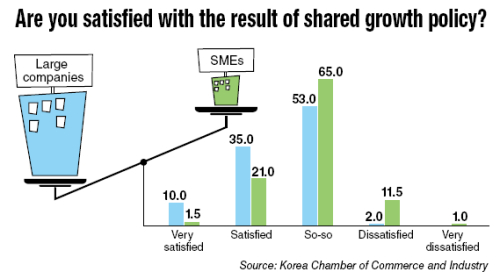
Polarization of society
Lee’s aides said his shift in policy reflects his frustration at or embarrassment with his initial policies putting emphasis on support for big businesses, including weak won, low interest rates and tax reductions, only resulting in making the livelihoods of working-class people more difficult and worsening the polarization of society.
A recent poll by the Korea Chamber of Commerce and Industry of 300 companies showed that most small businesses feel little effects from the shared growth policy Lee launched a year ago. Just one in five SMEs surveyed expressed satisfaction at the results of the policy.
Lee’s aides said the president was disappointed that big businesses, while continuing to reap huge profits on the back of his policies to lift regulations and expand support for them, remain passive in increasing investment and creating more jobs. Political observers say Lee apparently hopes to see his policy for shared growth bear fruits before he leaves office.
The loss of the trickle-down effect, in which increasing profits of chaebol are supposed to lead to more benefits for suppliers and self-employed people, may also be behind the political circles’ bashing of large enterprises.
“Politicians now see the expansion of conglomerates will not lead to increasing new jobs and improving livelihoods of working-class families,” a political commentator said.
“That means a pro-chaebol stance goes nowhere in gaining voter support, pressing politicians to hit chaebol companies for mistreating subcontractors and eroding the territories of small shops and traditional markets,” he said.
GNP lawmaker Chung Doo-un said the reform of chaebol will serve to “make our party shrug its reputation as a party for the rich.”
Some observers note what should be watched is whether politicians will follow through with their pledges to reform the chaebol after the two key elections next year, not repeating what political circles did in the past.
During their visit to the traditional market in Seoul last month, GNP leader Hong, Finance Minister Bahk and FKI head Huh, accompanied by hundreds of aides and reporters, had to shorten their tour scheduled for one hour to just 20 minutes after vendors complained their presence just stood in the way of their business.
“I felt like the current efforts by politicians to rein in big businesses may face similar public response if they lack the real will,” said a reporter who was on the scene, requesting anonymity.
By Kim Kyung-ho (khkim@heraldcorp.com)


![[Exclusive] Korean military set to ban iPhones over 'security' concerns](http://res.heraldm.com/phpwas/restmb_idxmake.php?idx=644&simg=/content/image/2024/04/23/20240423050599_0.jpg&u=20240423183955)
![[AtoZ into Korean mind] Humor in Korea: Navigating the line between what's funny and not](http://res.heraldm.com/phpwas/restmb_idxmake.php?idx=644&simg=/content/image/2024/04/22/20240422050642_0.jpg&u=)

![[Graphic News] 77% of young Koreans still financially dependent](http://res.heraldm.com/phpwas/restmb_idxmake.php?idx=644&simg=/content/image/2024/04/22/20240422050762_0.gif&u=)




![[Pressure points] Leggings in public: Fashion statement or social faux pas?](http://res.heraldm.com/phpwas/restmb_idxmake.php?idx=644&simg=/content/image/2024/04/23/20240423050669_0.jpg&u=)



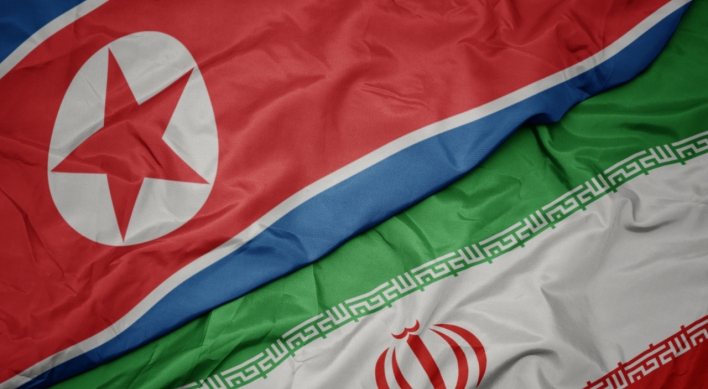
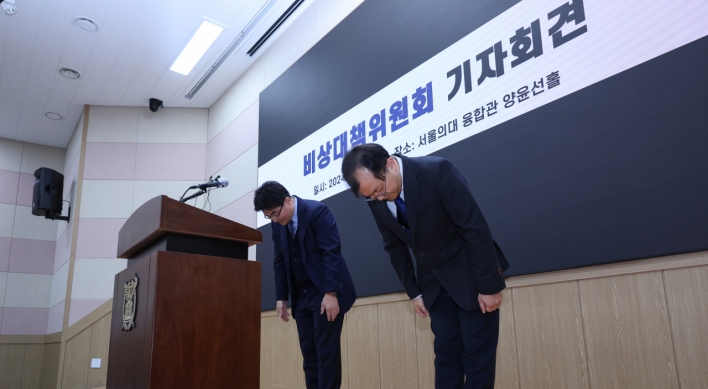
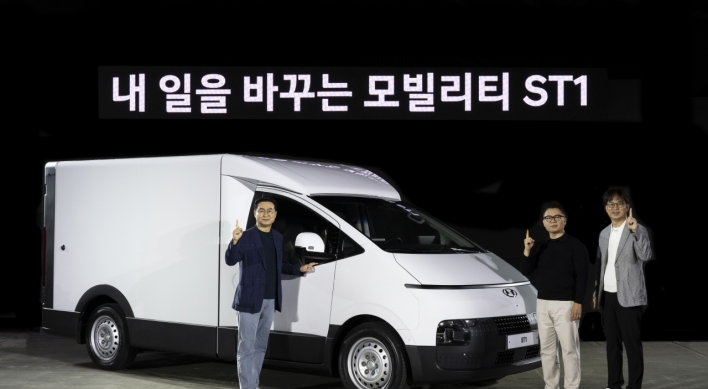

![[Today’s K-pop] Ateez confirms US tour details](http://res.heraldm.com/phpwas/restmb_idxmake.php?idx=642&simg=/content/image/2024/04/23/20240423050700_0.jpg&u=)